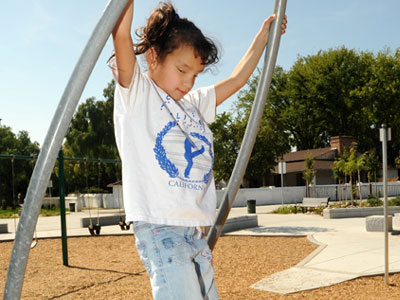
The young girl glides gracefully down the escalator in the BART station with her long white cane. At the bottom, she laughs and says, “That’s so funny” as people look on in wonder. For anyone in the station that night who believed that blind people are dependent and helpless, their attitudes were likely changed by watching this tiny girl move so fluidly and independently.
Graciela Tiscareno-Sato’s first child was born at 25 weeks
gestation, weighing just over a pound. Graciela and the baby’s father, Genro, could only pray she would live.“Milagro named herself,” says Graciela. Doctors had told her not to expect the baby to survive, but she did. “It was a miracle that she was born at all,” says Graciela. Though tiny Milagro was born, her premature birth left her without sight. Graciela says she was shocked but that she did not want to stay in permanent fear. Through the Blind Babies Foundation in Oakland, Graciela met blind adults and I saw a positive future for Milagro. “I asked for their help and I started seeing that blindness did not limit them or define them,” says Graciela.
Now, seven years later, Milagro enjoys downhill skiing, reads and writes Braille, plays trombone and has developed quite a routine on her trapeze in the family room. She enjoys gymnastics and is learning to dance. Not only has the family succeeded in raising a confident child, they are also inspiring other families to let their kids with disabilities simply be kids.
“As our daughter gets older and learns to navigate the world independently, we worry less about her and how she will grow up,” says Graciela. “We instead worry about the people she will encounter that will attempt to limit what she can do for herself and what she can achieve. We want to dispel the existing widespread ignorance on the topic of blindness in our society.”
Graciela says that she wants to hear less pity when people see Milagro walking by with her cane. Instead of ‘mira, pobrecita la niña no puede ver’, to hear comments like, “Wow! Look at how independent she is at such a young age!”
The family has an ambitious goal: by the time their daughter becomes an adult, make their communities places where the majority of people are educated on the accomplishments of blind people and the normalcy of their lives. Genro states, “We want to show the world that blindness can be relegated to being an inconvenience. One physical disability does not need to define and limit anybody.”
Graciela says Milagro is not afraid of failure. “She has had lots of examples of personal success as an independent person,” she says. Milagro’s independence, and lack of dependence, offers lessons of humility for people with sight. But Graciela and Genro’s goal is just to change people’s perspective when they see Milagro or other blind people. “What they will see are fiercely independent people who happen to be blind.”
To tell their story, the Sato family has created a DVD that shows by example why it’s critical for families (and educators) to let go of the urge to overprotect children with disabilities. The DVD is available at www.babymilagro.org/dvd. Proceeds go directly into Milagro’s college fund. The family donates ten percent of all sales to Blind Babies Foundation and the California Association of Parents of the Visually Impaired. These two organizations provided services in the first three years of Milagro’s life.
